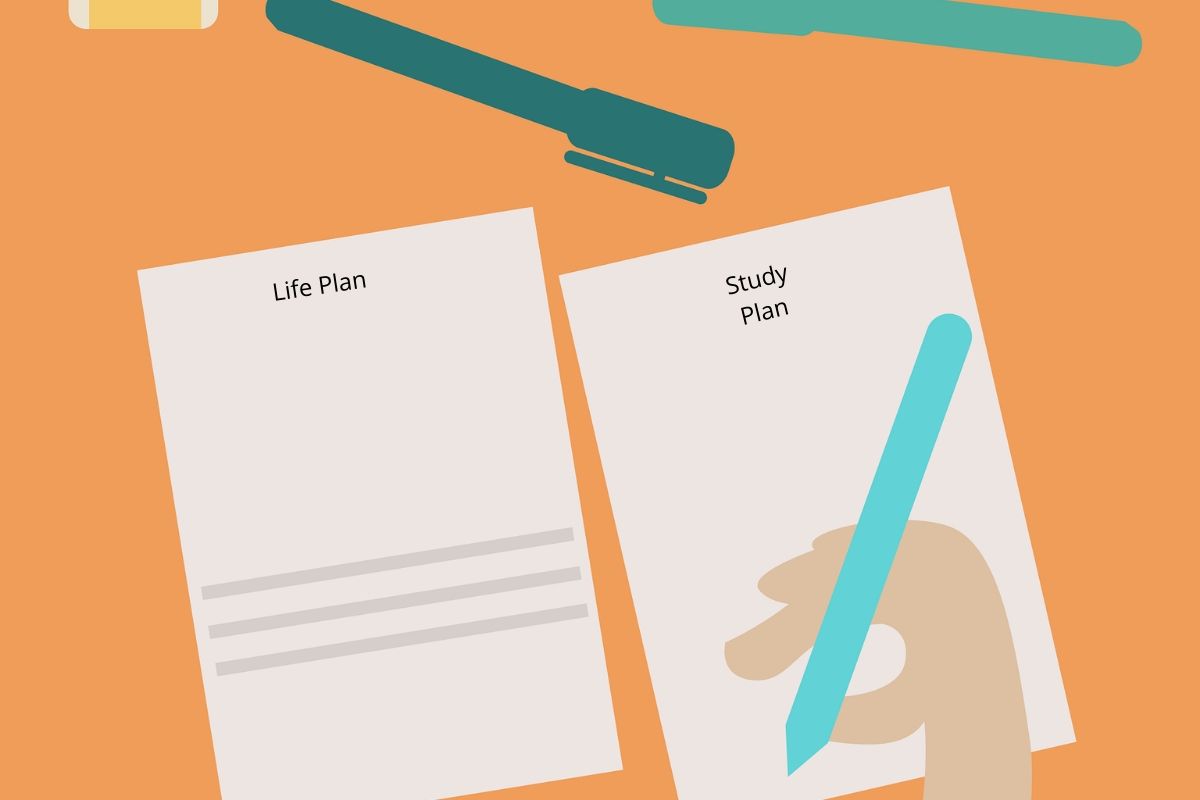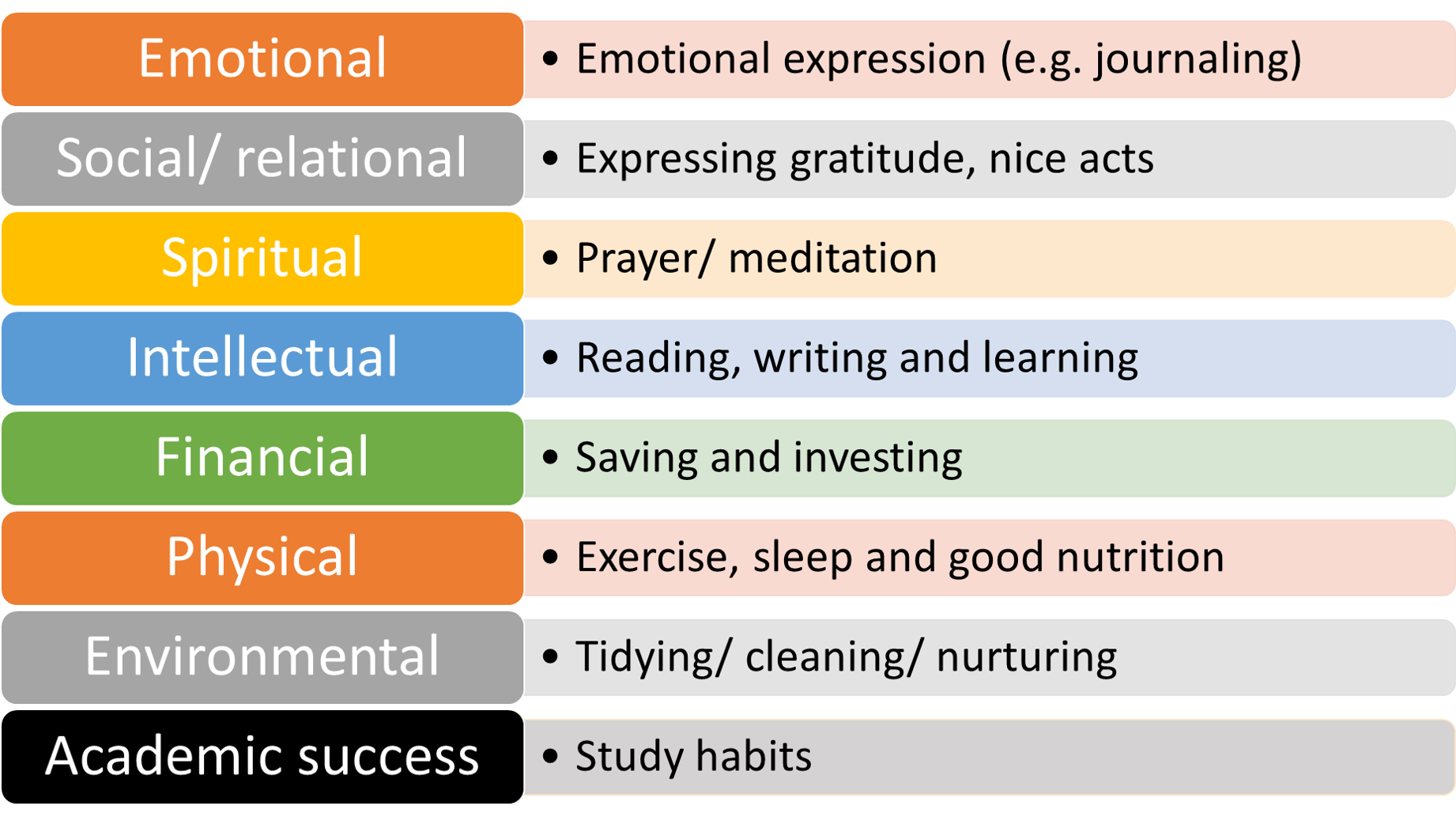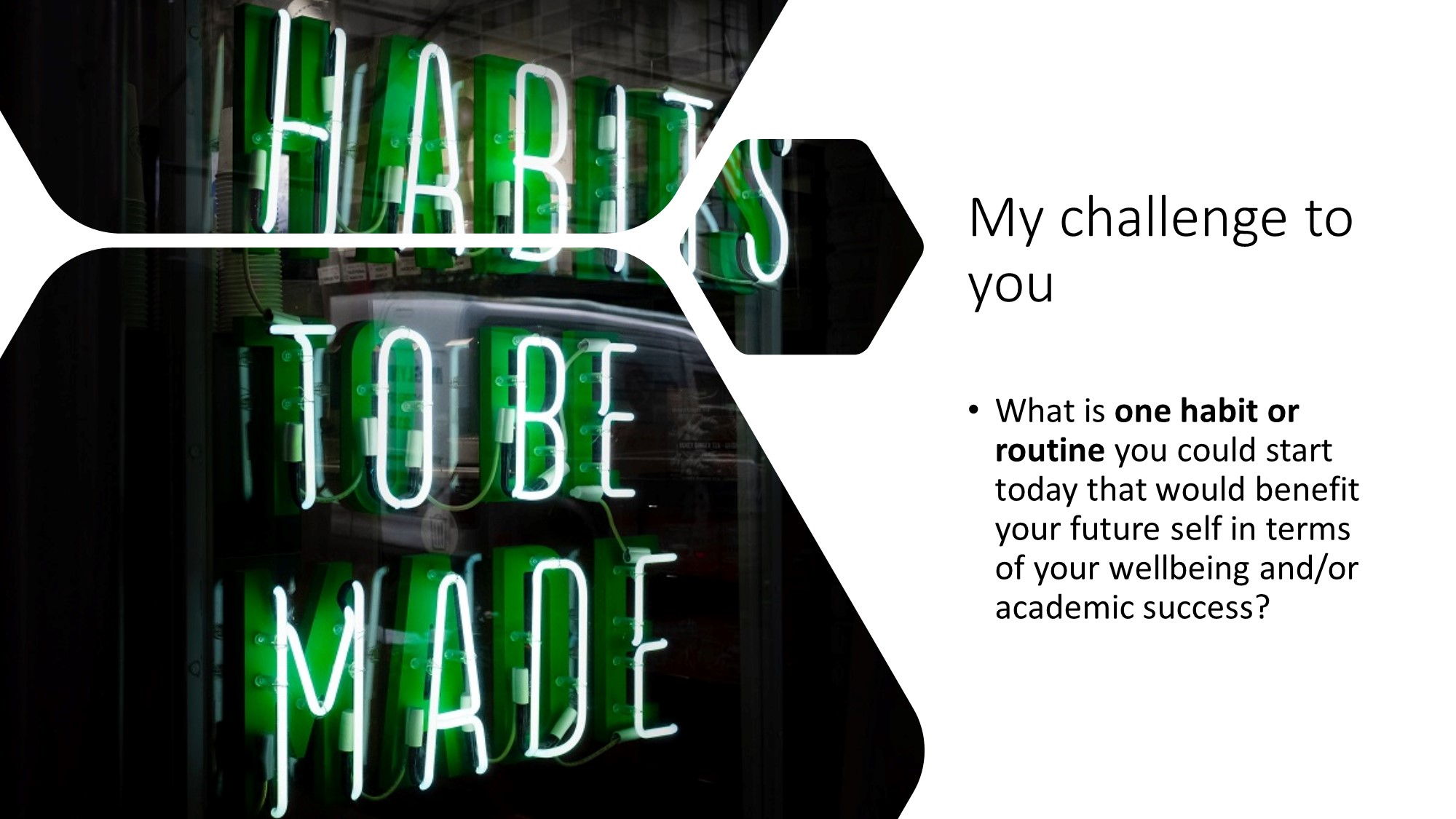
I recently gave a couple of presentations on the topic of Wellbeing for Academic Success.
The purpose of those presentations were to get new students thinking about 6 key concepts:
- What do we mean by wellbeing?
- What do we mean by academic success?
- How are the two related?
- What do wellbeing and academic success share in terms of how they are built? (spoiler: it is about habits)
- What kinds of habits should students develop?
- When should they start building those habits?
However these concepts are relevant to any student hoping to get off to a good start for the study year.
So I thought i’d summarise some of the key ideas of the presentation in this blog post.
What do we mean by wellbeing?
This is harder to answer than you might think because there isn’t a single universal definition of wellbeing. What constitutes the ingredients of a satisfying life for one person isn’t necessarily what it is for another person.
For example, there are different domains of wellbeing: emotional, social, spiritual, intellectual, financial, physical and environmental.
And when people answer the question ‘How are you doing?’ they might draw on multiple source of information in constructing their evaluation of how they are doing in life.
- Their mood
- The presence of physical or mental illness
- Their subjective assessment of how they are doing in different aspects of their life
- Objective indicators like income, housing, expenses
- How the groups they associate with (e.g. family, colleagues) are doing
- The presence of significant challenges in their life and their perceived ability to cope with these challenges
- The kinds of resources and services they have available to them (e.g. people, money, jobs, entertainment)
- Whether they have meaning and purpose in their life
- The health of the community, society, country in which they live
- The health of the planet on which they live
So when we talk about someone’s wellbeing, we aren’t assessing the extent to which they conform to an already existing definition of wellbeing. We are instead interested in how that person views their life, having assessed all the relevant inputs.
Thus, when you self-assess your own wellbeing, it is important to view your life from multiple perspectives. This helps counteract the tendency to assess our life on the basis of a single domain.
For example, my mood has been quite low for the last few months. If I were to assess my wellbeing, purely on the basis of my mood, I’d rate my wellbeing as low. But when I look at my life from other perspectives (the people in my life, the resources I have access to, the work I get to do, having a sense of purpose, living in Australia), I realise my wellbeing is actually quite high. It doesn’t negate my low mood or mean I shouldn’t try to change it, but it puts the low mood in a broader context.
Wellbeing has multiple facets and all should be considered when self-assessing your own wellbeing.
What do we mean by academic success?
In the same way that we have a tendency to define wellbeing in too simple a fashion, we also tend to do this with academic success.
Often we just look at grades, marks or GPA.
Whilst these can be excellent metrics for academic success, relying solely on them ignores the many things a person can get out a university degree that have significant value and are thus an indicator of academic success.
Some students love the overall experience of being at Uni: the lectures, the people, the events, the programs etc. They are sometimes willing to take a hit in terms of grades (happy with passes and credits) so that they can participate in more of the experiences that universities offer.
Some students come to uni to learn specific hands-on skills – lab work, robotics, art and creative design. They might not be super keen on the more academic elements of their course (e.g. essays, written assignments) but are happy as long as their skill level is increasing.
For students that get off to a not great start, academic success is often more about the improvements they make over time, than their average performance (GPA). They consider themselves successful if they can pick themselves up, shake off the bad start, and get better at being a student.
And we mustn’t forget that for many, degrees are a pathway to better and more interesting work. Whether you get your degree with a high distinction average or a credit average, the degree itself is a passport to a different working future. We see some students find new and interesting work during their degree (often as part of work placements), sometimes negating the need to even finish! (admittedly this is relatively rare).
The point is, grades aren’t everything. There is much more to the university experience and ‘academic success’ comes in a number of flavours.
How are wellbeing and academic success related?
Generally what we see is a modest positive correlation between wellbeing and academic success. The happier and healthier a student is, the better they do at their studies and the more they enjoy their studies. This is borne out in the research.
Typically the relationship is considered to be in the direction of higher wellbeing –> better academic outcomes, but here at the health service, we do see examples of the opposite. For example, we see students who develop poorer mental health following a period of academic failure (e.g. failed assignments, unsubmitted work, loss of interest in study). This is sometimes the case with students who have perfectionist tendencies. They base their self-worth on how they are doing academically and any academic setbacks lead to significant distress.
As such, we tend to work from the assumption that wellbeing and academic success are intertwined – mutually influential.
The most important implication of this relationship however is that students wishing to improve their university experience have two avenues through which they might do it. One is to address directly their studies (e.g. develop better study habits – see below). The other is to consider whether improvements to their physical or mental health might be helpful also. This might take the form of improving their sleep, nutrition, physical activity and reducing drug/alcohol intake.
What do wellbeing and academic success share in terms of how they are built? (spoiler: it is about habits and routines)
Although they are separate constructs, academic success and wellbeing are built in similar ways.
That is, through habits and routines.
Habits are relatively simple behaviours or actions that we engage in that are well-established and mostly automatic. Brushing one’s teeth is a common example. The more good habits we can develop, the more we can put our health and wellbeing on auto-pilot.
Routines are more complex chains of behaviour that are regularly followed. They are less automatic than habits, because they are typically more complex, but they are still built into our lives. For example, I do a specific weights program twice a week. The weights program is the routine. The habit that precedes me doing doing that routine is filling up my water bottle and going into my home gym at two designated times each week.
If you take a moment to reflect on the different areas of wellbeing and academic success, you’ll realise that making improvements in any of these areas requires habits and routines. We don’t build financial wellbeing by saving money just once. It happens through ongoing saving. We don’t build physical wellbeing by exercising just once. It happens through regular exercise.

I’m building a mental fitness workbook at the moment that will delve a little further into habit formation and I hope to write a dedicated post on habit formation in the near future.
In the meantime, I strongly recommend BJ Fogg’s work on habit formation if this is an area you find interesting and you want to understand the mechanics of habit formation.
What kinds of habits should students develop?
I think students should consider developing habits in 4 main areas:
Lifestyle
The standard advice for just about everyone is good nutrition, regular predictable sleep, 30 minutes of physical activity a day and reduce drug and alcohol use.
The same applies to students, who we know, on average, tend to score poorer on indices of lifestyle.
You can start building better habits in relation to nutrition, physical activity and sleep in small steps.
- Add 1 serve of veggies to your daily intake
- Go for a 10 minute walk at lunchtime
- Go to bed 30 minutes earlier
The changes you make don’t need to be massive. Just get started making small improvements in each of these areas.
Study
Over the past couple of years, we’ve been pulling together tips for study, exam preparation and writing. Sift through our suggestions, or consider utilising the services of the Student Learning Centre to hone your study habits.
As with lifestyle habits, you don’t have to make massive changes. Just look to refine your study habits over time.
- After reading a chapter or paper, spend 10 minutes writing down the main things you remember from the reading
- Start all assignments at least 2 weeks (if possible) before they are due so you have time to do multiple drafts
- At the beginning of each day, write the 3 most important tasks you have to do in your diary/calendar
Social
Close and supportive relationships are arguably the most important buffer we can all have against the challenges of life. Knowing we have people who will step up practically and emotionally to help us during difficult times is often enough to help people power through difficult times.
Building and maintaining such relationships requires ongoing effort. Schedule time in your calendar to catch-up with important people face-to-face. Use email and social media to communicate between these face-to-face encounters. Engage in regular acts of kindness towards those family and friends you value.
In romantic relationships, ensure you allocate specific time to be together, uninterrupted. Make a point to listen to what your partner is trying to achieve in their life and look for ways you can help make that happen.
These regular investments in your most important relationships will ensure they are strong, and that you will be able to call on these people when you need their help.
Psychological
When people talk about habits, they tend to focus on observable behaviors. But habits are mental/psychological as well.
For example, some students get into the habit of telling themselves ‘I can do that tomorrow’, which is a precursor to procrastination.
One of the psychological habits that we see commonly in students is self-criticism – a tendency to negatively assess themselves as a person, following an academic setback. A student gets a bad mark on an assignment and quickly starts labelling themselves as stupid, lazy, an idiot, worthless.
Whilst constructive self-criticism can be OK (e.g. identifying areas for improvement), we encourage students to instead adopt a self-compassionate approach to failure.
A self-compassionate approach to failure involves:
- Being gentle with yourself, like how you would treat a friend
- Reminding yourself that failure is a core human experience
- Taking a moment to name and acknowledge the unpleasant feelings that come with failure but also realise these are transient and not to get carried away with them
- Working out what you need to do next in order to reduce the likelihood of making that mistake again
When should students start building these habits?
Now.
The earlier in the year, and earlier in your degree that you can establish good lifestyle, social, study and psychological habits, the better.
Think of it as an investment in the health and wellbeing of your future self, the one that has end-of-year exams and who hopes to come back next year to continue the degree.

Take-home points
- Wellbeing is multi-faceted. When self-assessing your wellbeing.
- Academic success is much more than just grades. It is about everything that you get from the university experience.
- Wellbeing and academic success are related. Investments you make in one area will benefit the other.
- Forming good habits and routines is central to building wellbeing or academic success.
- Students should be building good habits in the areas of lifestyle, study, social and psychological
- I challenge you to think of one habit or routine you could start today that would help you improve your wellbeing or improve your university experience.

